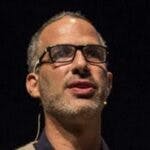Published: 14 January 2024
Last updated: 5 March 2024
After an attack on two Israelis who were speaking Hebrew, MATI SHEMOELOF questions whether he can feel safe speaking his native language in his new home.
Last week, when I returned home from a vacation in Bavaria with my parents, who visited to get some rest from the war in Israel, I received a phone call from an Israeli radio reporter. She asked if I knew the identity of the two Israelis speaking Hebrew who were attacked at a local eatery, near my home in Berlin. My heart sank. What should I tell my parents? And what should I do with this information? Should I continue speaking Hebrew in Berlin?
During our vacation in southern Germany, my parents asked me several times not to speak Hebrew on the streets of Nuremberg. I ignored their request. I classified them as people who watched too much Israeli television and became convinced them that the whole world was currently antisemitic towards Israel. I thought I was allowed to speak Hebrew without fear.
Then, a conflict erupted in which 1,385 Israelis lost their lives, and up to 23,210 Palestinians died and continue to suffer. Israeli hostages, kidnapped by Hamas, have yet to return. The tensions and animosity are pervasive. Now, the harsh reality has confronted me.
Suddenly, the map of Berlin that had been relatively protected seemed trembling, torn, and irreparable.
First, I asked myself: are the people who were attacked Israeli tourists or local Israeli-Berliners? As if there was a difference. Or was there any provocation involved? But quickly, after sharing my thoughts with some friends, I realised that I shouldn't seek to attach blame to the victim. There is no justification for antisemitic violence. Speaking Hebrew in Berlin is allowed, and even very important after the Holocaust.
Recently I even wrote in Haaretz, on the importance of speaking and writing Hebrew in Berlin: Between the two world wars, there were more Hebrew-language publications in Berlin than in the Jewish settlements of Israel (before the founding of the state in 1948). And with the return of Israelis to Berlin, Hebrew is and should be heard again.
Yet now, I am starting to think about keeping my Hebrew secret. A few days after this awful attack, I went to meet more families of Israeli friends in Kreuzberg, a very Israeli-friendly neighbourhood. Everybody was asking "Should we continue speaking Hebrew in Berlin?" They knew quite a few people who had stopped visiting neighbourhoods where there is a majority of Arabs. Iif they had to go to the Hermannplatz shopping centre, where the attack happened, they spoke German or English with their children. The city of Berlin has shrunk for them.
what will happen if the war intensifies in Gaza and causes a deeper rift within the lives of Israelis in Berlin?
My German friends of Kurdish origin already avoided travelling to Mecklenburg-Vorpommern, a big northern state where white German far-right terror groups were sometimes found. On the other hand, there were people like me who opted to reside in or close to Arab neighbourhoods, where it has always been peaceful.
I start to wonder whether the absence of violence in the past was because I was a father walking with a child. I wonder if the situation might change once if I am alone and talkign Hebrew on the phone.
During my exchanges with the other families, I started thinking about the boundaries of where it is advisable or not advisable to go. There were streets that seemed dangerous to some people and others that seemed more secure. There were neighbourhoods that appeared safer and those that were less so. Suddenly, the map of Berlin that had been relatively protected until now seemed trembling, torn, and irreparable. And among all of us stood another question: what will happen if the war intensifies in Gaza and causes a deeper rift within the lives of the Israeli community in Berlin, as well as other diaspora communities?
I left the meeting with the other Israeli families feeling unsure about what was right or wrong. When my daughter spoke to me in Hebrew, I instinctively glanced around, anxious about who might be listening.
I took to Instagram to share my dilemma, seeking advice on how to handle the situation. To my relief, most responses were positive, urging me to continue speaking Hebrew. One German friend even expressed shame that such a question had to be raised. Reflecting on the historical tragedies of the Holocaust, I contemplated the significance of reclaiming Hebrew as a diasporic identity. In tribute to those who endured, I resolved not to bow my head and conceal my identity.
Although I am exercising caution, I have pledged not to succumb to silence. However, the critical question lies not in my personal decisions but in the reality surrounding me. Will I jeopardise my safety amidst the ongoing conflict? The unsettling truth is that we may never truly feel secure if this war continues to claim the lives of both Israelis and Palestinians.
RELATED STORY
Novelist breaks with German publisher amid call for wider cultural boycott over Gaza (Guardian)
Bosnian-Serbian novelist Lana Bastašić has terminated her contract, decrying ‘censorship’ of pro-Palestinian voices in Germany.




